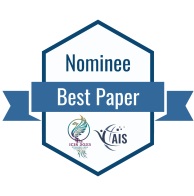Blockchain, DLT, and Fintech
Loading...
Paper Number
2574
Paper Type
short
Description
The development of the Fintech Ecosystem brings radical socio-economic value by increasing entrepreneurship, innovation, and financial inclusion. Yet, there is a lack of knowledge regarding how value is co-created among the actors in the Fintech Ecosystem. The research objective is to conduct an in-depth case study in the Australian Fintech Ecosystem to explore the processes and mechanisms of value co-creation. Our study develops a framework for understanding value co-creation facilitated through digital affordance infrastructure. The study has several potential theoretical contributions to the literature on Fintech Ecosystem development by providing insights into antecedent conditions, mechanisms, paradoxical tensions, and outcome attributes derived from the framework. For practitioners, our framework could assist regulators and organizations within the ecosystem in gaining a deeper understanding of the processes necessary for continued success. Regulators could adjust the intensity of controls in response to environmental uncertainties and tensions.
Recommended Citation
Dhavamani, Prakash; Muthukannan, Priyadharshini; Tan, Barney; and Gozman, Daniel, "Value Co-creation in Fintech Ecosystem: A Case Study of Australia" (2023). ICIS 2023 Proceedings. 15.
https://aisel.aisnet.org/icis2023/blockchain/blockchain/15
Value Co-creation in Fintech Ecosystem: A Case Study of Australia
The development of the Fintech Ecosystem brings radical socio-economic value by increasing entrepreneurship, innovation, and financial inclusion. Yet, there is a lack of knowledge regarding how value is co-created among the actors in the Fintech Ecosystem. The research objective is to conduct an in-depth case study in the Australian Fintech Ecosystem to explore the processes and mechanisms of value co-creation. Our study develops a framework for understanding value co-creation facilitated through digital affordance infrastructure. The study has several potential theoretical contributions to the literature on Fintech Ecosystem development by providing insights into antecedent conditions, mechanisms, paradoxical tensions, and outcome attributes derived from the framework. For practitioners, our framework could assist regulators and organizations within the ecosystem in gaining a deeper understanding of the processes necessary for continued success. Regulators could adjust the intensity of controls in response to environmental uncertainties and tensions.
When commenting on articles, please be friendly, welcoming, respectful and abide by the AIS eLibrary Discussion Thread Code of Conduct posted here.




Comments
07-Blockchain